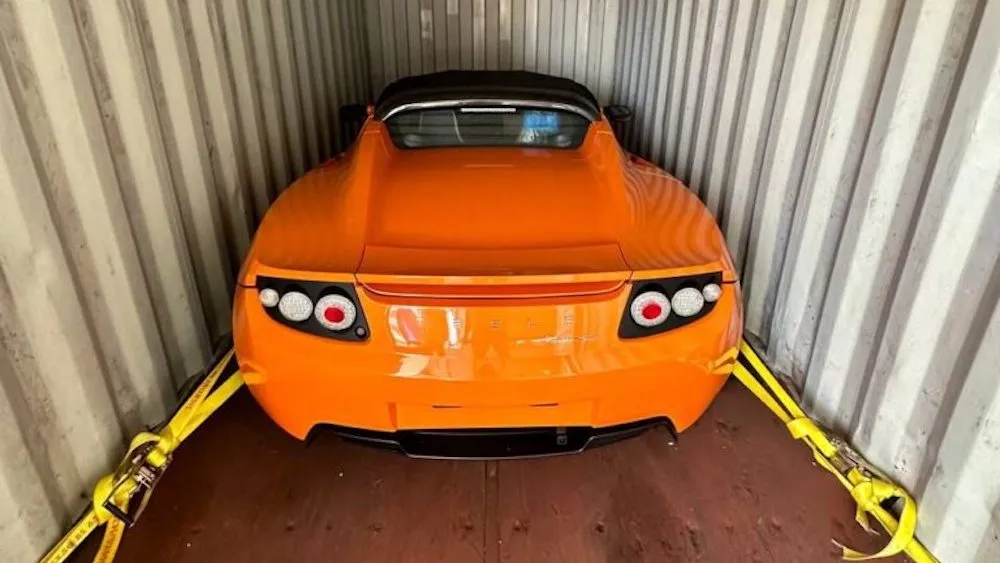After 12 years of uncertainty, it appears that the trio of virtually brand new, barely touched Tesla Roadster examples, found languishing in shipping containers stuck in China, may have finally attracted a buyer. Surprisingly, the individual footing the bill is someone whom many would least suspect.
The independent Tesla Service Center in Washington state, Medlock and Sons, recently welcomed a visit from the YouTube channel “What’s Inside? Family” (via CarScoops).
Carl Medlock, who was part of the original team that produced the Roadster, owns and operates the shop. O’Dowd sent his new acquisitions to Medlock’s shop, presumably to have them refreshed after years of being stored in a shipping container, which caused some moderate damage.
On a highly publicized campaign against Tesla’s so-called Full Self Driving (FSD) software stands O’Dowd. He holds a strong disdain for AI-driven software that appears to make crucial decisions prioritizing human safety, with Tesla’s FSD software being a prime example in his view.
Through his organization, “The Dawn Project,” O’Dowd has been financing political campaigns aimed at banning Tesla’s FSD. He even personally funded Super Bowl Ad time to broadcast his test videos of FSD-equipped Teslas encountering child-sized mannequins.
It wouldn’t be surprising if many believed O’Dowd to be the last person willing to spend any money on a Tesla. However, that assumption would be incorrect.
Surprisingly, O’Dowd is an enthusiast of the first Tesla Roadster and has amassed several of them in his private collection. The latest additions to his collection are none other than the Roadsters that have been stranded in China for over a decade.
Significant issues are evident, such as the cracking and deterioration of the factory clear vinyl wrappings and the clear coat on some carbon fiber components on the hood and front lip.
One of the original tires on a Roadster degraded to the extent that it cannot maintain air pressure. However, the most pressing concern is the near-complete bricking of the Roadster’s batteries due to prolonged inactivity.
The estimated cost of replacing the battery pack for each car is around $35,000, as stated by the video’s host. Despite these challenges, all three vehicles are in relatively good condition. If you are unable to view the video presently, we have provided screenshots of the cars in the accompanying image gallery.
Rare as they are, Tesla Roadsters from the original lineup are increasingly scarce, and the specific trio acquired by O’Dowd likely represents the rarest specimens. The narrative goes that a Chinese firm originally procured these vehicles straight from the assembly line.
Rumor has it that the firm intended to reverse engineer the Roadsters, but they ended up detained by the Chinese government at a shipping port, where they languished for 12 years.
Remarkably fresh, each car boasts a mere 104 miles on the odometer from the initial testing conducted post-assembly. Since they never made it to a dealership, these could potentially be the only three Tesla Roadsters globally that have never been titled or registered, according to Medlock.
Although Medlock didn’t disclose the exact purchase price for the Roadsters, he did shed light on some of the financial considerations. “The cars were $125,000 new [in 2010],” Medlock stated. “Some of these cars optioned the way they are, $160,000. If you add the inflation over the years, he [O’Dowd] paid retail for the new cars of what they would be today.”
Based on data from the U.S. Bureau of Labor Statistics, $125,000 in 2010 translates to $177,916 in 2024, while $160,000 in 2010 amounts to $227,732 today.
Therefore, O’Dowd likely paid approximately $533,750 for all three cars on the lower end and as much as $683,200 on the higher end, excluding the $105,000 it would cost to replace the batteries in each Roadster, along with additional fees and taxes.
This substantial sum becomes even more surprising when considering that O’Dowd doesn’t intend to drive them.
Instead of making the Teslas roadworthy, O’Dowd plans to showcase them in a museum due to their rarity. This decision certainly doesn’t align with the behavior one would expect from a Tesla detractor. Perhaps O’Dowd’s grievances with Tesla are truly confined to the FSD software.
Also read: Tesla Cybertruck’s Water Capabilities Examined: Floating Myth or Reality?

